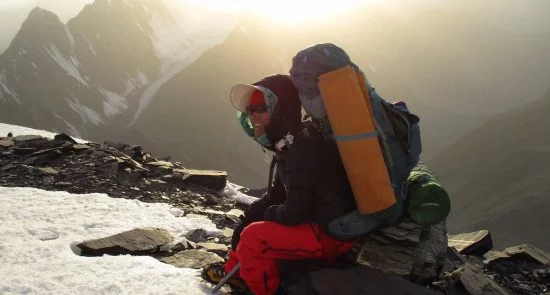Afghanistan, Social November 12, 2018
Short Link:‘I did it for every single girl’: the first Afghan woman to scale Mount Noshaq

Conquering Afghanistan’s highest peak was once unthinkable for Hanifa Yousoufi. Then she joined a climbing group, braving frostbite and the Taliban to strike a blow for gender equality.Ariana News Agency- in a quiet corner of Kabul, a dozen young women welcome their friend back from the summit of Afghanistan’s highest mountain. Like many Afghan women, Hanifa Yousoufi had always been made to believe, growing up, that she shouldn’t go to school or play sport. Yet the 24-year-old has become the first Afghan woman to climb Mount Noshaq.
The young women gathered here are among the 70-strong cohort meeting six days a week to learn the art of climbing, something many never imagined they would have a chance to do, the Guardian reported.
Yousoufi explains that because her family are illiterate, there was no encouragement for her to get an education. Instead, she worked as a cleaner to help support the family.
“I used to watch other girls in their school uniforms going to school, and I wanted to go,” she says. “But I would just think: ‘No Hanifa, you are not clever like them. Even if you tried, you are not on their level.’ But also, I wanted to stay home and support my family and for my father to feel better about life – he was always working.”
A friend introduced Yousoufi to Ascend Afghanistan, run by US organisation Ascend Athletics. When she joined the group in 2016, she had never heard of a crampon – or even attempted a sit-up. Yet in 2017 she ran a marathon, and after months of training she became part of a small team preparing to tackle Noshaq.
Climbing in Afghanistan is risky, not just because of the dangers involved but because active insurgency is still a constant threat. The day before the team set off, the Taliban launched an attack nearby, almost scuttling the attempt.
“I was nervous because of the fighting so close by,” recalls Yousoufi, who suffered frostbite in one of her toes and altitude sickness during the expedition. “I was so tired and didn’t think I would be able to make it down. But I was so determined.”
The programme was founded in 2015 by Marina LeGree, who had previously worked for development organisations in Afghanistan for several years, and was employed by Nato at the height of the war. LeGree explains that witnessing the relentlessly disparaging way in which Afghan women are treated by men was the impetus for a programme that targets empowerment through mountaineering and leadership training.
“I just thought we need to have some bad-ass women who can shut people up a little bit,” says LeGree. “At the time I was developing the idea for the programme, I was living in Kabul and would often go and play basketball with the Afghan women’s basketball team. They faced danger getting to and from the gym because of the civil unrest, were ridiculed by all the boys, and then had to deal with comments about what they looked like from the security guards.
“This is symbolic of what women face every day in Afghanistan; ridicule and constant harassment, but always expected to deliver. It made me want to … help them do things that most men couldn’t do.”
In 2015 the first group of women to attend the programme, aged between 15 and 22, completed a 17-day trek taking in three of the region’s highest peaks, all over 4,876m. They named one unclimbed mountain Daughters of the Afghan Lion peak.
The girls all look up to project coordinator Freshta Ibrahimi, says LeGree. Coming from an illiterate family, Ibrahimi has experienced extreme poverty and understands the challenges the girls go through from bitter personal experience.
In 2016, while a student at Kabul’s American University of Afghanistan, Ibrahimi and her friend were only a few metres away from two attackers who stormed the campus with guns and explosives. Twelve people were killed in the attack, Ibrahimi’s friend among them.
“The girls have to deal with so much on a daily basis,” says LeGree. “We are lucky none of our girls have been hurt, but every time there’s an attack it hits close. Someone always knows someone who’s been there.”
Yousoufi trekked to base camp with Ibrahimi, as well as another teammate and two guides, including Norwegian Vibeke Sefland, who reached the summit with her. For Yousoufi, the trek was as much about striking a blow for gender equality in a society dominated by men as it was about scaling the second highest mountain in the Hindu Kush.
Advertisement
“Climbing Noshaq was much harder than the other mountains I’d climbed,” she says. “But I kept telling myself that finally this was the moment an Afghan girl was going to make it to the top.
“I did this for every single girl. The girls of Afghanistan are strong and will continue to be strong.”








